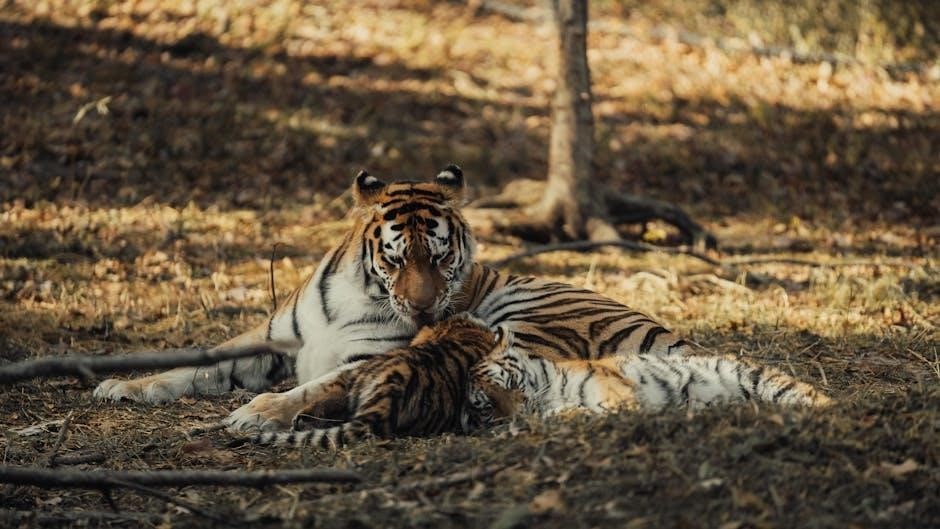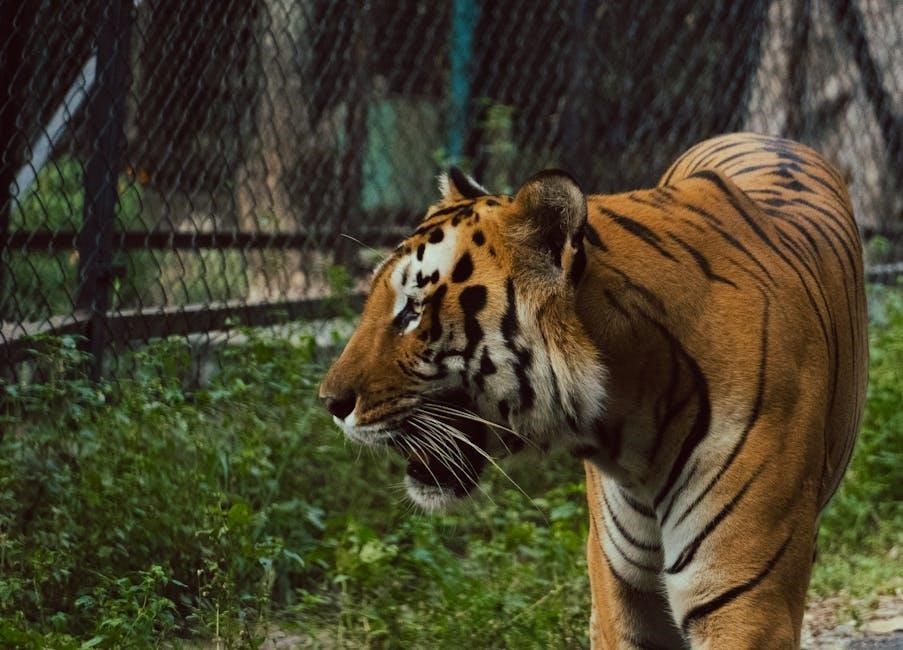“Battle Hymn of the Tiger Mom” by Amy Chua explores intense parenting practices, sparking debates on child-rearing․ This memoir highlights cultural differences in raising high-achievers․

Overview of “Battle Hymn of the Tiger Mom”
The memoir delves into Amy Chua’s controversial parenting methods, blending strict discipline with unconditional love, while sparking debates about cultural identity and child-rearing practices․
2․1․ Background of the Book
“Battle Hymn of the Tiger Mom” was first published in 2011, sparking widespread debate about parenting styles․ Amy Chua wrote the book to share her experiences as a Chinese-American mother, blending memoir and manifesto․ She sought to challenge Western parenting norms by advocating for a stricter, achievement-focused approach․ The book was inspired by her own upbringing and her desire to preserve her cultural heritage for her children․ Despite the backlash, Chua aimed to provoke a discussion about the value of hard work and resilience in raising successful children․ The book became a cultural phenomenon, with its controversial ideas resonating globally․
2․2․ Key Themes and Messages
The book centers on the clash between Eastern and Western parenting philosophies, emphasizing the importance of hard work, filial piety, and academic excellence․ Chua argues that Tiger Parenting fosters resilience and success, often at the cost of childhood enjoyment․ She challenges the Western emphasis on self-esteem, asserting that criticism and high expectations drive achievement․ Themes include cultural identity, immigrant ambition, and the sacrifices made by parents for their children’s futures․ While controversial, the book highlights the tension between traditional values and modern parenting practices, sparking a global conversation about what constitutes effective parenting and the true cost of pushing children to excel․

The Author: Amy Chua
Amy Chua is a Yale Law professor and writer, known for her provocative ideas on parenting and culture․ Her book sparked global debates on parenting styles․
3․1․ Early Life and Education
Amy Chua was born in 1962 in Champaign, Illinois, to Chinese immigrant parents․ Her father was an engineer, and her mother a homemaker․ Raised in a strict household, Chua excelled academically, graduating from Harvard College and later earning a JD from Harvard Law School․ Her upbringing deeply influenced her views on education and parenting, which she later articulated in her writing․ Chua’s academic achievements and cultural background shaped her perspective on high-achieving cultures and parenting styles, setting the foundation for her controversial yet thought-provoking ideas in “Battle Hymn of the Tiger Mom․”
3․2․ Motivations Behind the Book
Amy Chua wrote “Battle Hymn of the Tiger Mom” to share her personal parenting philosophy and experiences․ She aimed to explain the strict, demanding approach she adopted, rooted in her cultural heritage․ Chua sought to challenge Western parenting norms by highlighting the intense focus on academic and extracurricular excellence․ She hoped to provoke a broader conversation about cultural differences in child-rearing․ By recounting her own journey, Chua intended to defend her methods against criticism and explore the tensions between traditional values and modern expectations․ The book reflects her desire to convey the reasoning behind her controversial parenting style and its impact on her children․
The Concept of Tiger Parenting
Tiger Parenting is a demanding approach emphasizing achievement and strict discipline․ Rooted in Asian heritage, it prioritizes academic and extracurricular excellence, preparing children for success through rigorous standards․
4․1․ Definition and Philosophy
Tiger Parenting is an intense, demanding approach to child-rearing that emphasizes high expectations, strict discipline, and achievement․ Rooted in Asian cultural values, it aims to prepare children for a competitive world by fostering resilience, hard work, and sacrifice․ This philosophy centers on pushing children to their limits, often through relentless practice, academic rigor, and high-pressure environments․ It contrasts sharply with more permissive Western parenting styles, which prioritize creativity and self-expression․ While critics argue it can be overly harsh, proponents believe it equips children with the skills and mindset needed for long-term success․ Battle Hymn of the Tiger Mom vividly illustrates this approach, sparking both admiration and controversy․
4․2․ Techniques and Strategies
Tiger Parenting employs strict, high-pressure techniques to drive children toward excellence․ Amy Chua’s methods include demanding intense practice sessions, enforcing rigorous academic focus, and pushing children to avoid failure․ She emphasizes perfection, often through harsh criticism, to foster resilience․ Playdates, sleepovers, and extracurricular activities deemed “unproductive” are banned, prioritizing instead piano, violin, or math drills․ Public shaming and high expectations are tools to motivate children to meet lofty goals․ Chua believes in shielding children from failure by preparing them for challenges, even if it means sacrificing childhood freedoms․ These strategies, while controversial, reflect a belief that extreme effort and dedication yield extraordinary results․ The approach is both demanding and tightly controlled․
Cultural Context
The cultural context of Tiger Parenting reflects traditional Asian values of hard work and academic excellence, heavily influenced by heritage and contrasting with Western parenting approaches․
5․1․ The Role of Asian-American Culture
Asian-American culture plays a pivotal role in shaping the Tiger Parenting philosophy․ Rooted in traditional Asian values, it emphasizes academic excellence, filial piety, and collective family honor․ The cultural expectation of achieving success not only for personal fulfillment but also to honor one’s family and community drives Tiger Moms to push their children relentlessly․ This mindset, often contrasted with Western parenting styles, reflects the immigrant experience and the desire to thrive in a new society․ The book highlights how Asian-American culture fosters an environment where hard work and sacrifice are seen as essential to overcoming barriers and securing a better future for the next generation․
5․2․ Criticisms and Controversies
Amy Chua’s “Battle Hymn of the Tiger Mom” sparked intense debate, with critics accusing her of promoting an overly rigid and harmful parenting style․ Many argue that Tiger Parenting prioritizes academic achievement over children’s emotional well-being, potentially leading to anxiety and depression․ The book was criticized for its strict, high-pressure approach, which some viewed as abusive․ Critics also highlighted the lack of empathy and the emphasis on perfection, which they believe can stifle creativity and self-expression․ Additionally, the memoir was accused of perpetuating stereotypes about Asian-Americans and oversimplifying the complexities of cultural identity․ The controversy surrounding the book has led to broader discussions about parenting styles and their long-term effects on children․
The Psychological Impact on Children
The Tiger Mom approach has sparked debates about its effects on children’s mental health, with some asserting it fosters resilience and achievement, while others warn of emotional strain․
6․1․ Positive Outcomes
Children raised through Tiger Parenting often exhibit exceptional academic and extracurricular achievements, demonstrating resilience and a strong work ethic․ This approach fosters confidence and self-discipline, equipping them to excel in competitive environments․ Many Tiger Moms’ children grow into high achievers, excelling in fields like academia, arts, and professions․ The emphasis on perseverance and high standards can cultivate a growth mindset, enabling them to overcome challenges and strive for excellence․ While criticism exists, supporters argue that these outcomes reflect the effectiveness of the Tiger Mom philosophy in preparing children for success in a demanding world․
6․2․ Potential Drawbacks
The Tiger Mom approach has drawn criticism for its potential negative effects on children’s emotional well-being․ Critics argue that the intense pressure and criticism can lead to anxiety, depression, and low self-esteem․ Some children may feel unappreciated or develop a fear of failure, damaging their relationship with their parents․ The strict focus on achievements can also limit creative freedom and stifle a child’s natural interests․ Additionally, the lack of emphasis on emotional support may leave children ill-equipped to handle setbacks or develop social skills․ These criticisms highlight the risks of an overly demanding parenting style that prioritizes success over a child’s mental health and happiness․

Real-Life Examples from the Book
Amy Chua shares vivid real-life examples from her journey as a Tiger Mom, showcasing both the triumphs and struggles of her parenting approach․
7․1․ Success Stories
The book highlights numerous success stories, showcasing how Tiger Mom parenting led to exceptional achievements․ Sophia, Amy’s eldest, excelled in piano and academics, while Lulu, her younger daughter, mastered the violin despite initial resistance․ These successes underscore Chua’s belief in pushing children to their limits, fostering resilience and excellence․ The memoir illustrates how high expectations and rigorous discipline can yield remarkable results, aligning with the cultural values Chua emphasizes․ These stories serve as powerful examples of how Tiger Parenting can cultivate high-achievers, sparking debates about the merits of such an intense approach to child-rearing․
7․2․ Challenges Faced
Amy Chua’s daughters faced significant challenges due to her strict parenting․ Lulu, her younger daughter, rebelled against the intense pressure, leading to emotional conflicts and power struggles․ The memoir reveals the toll Tiger Parenting took on family relationships, with Lulu resisting her mother’s demands and questioning her methods․ Chua also faced criticism for her approach, with many accusing her of being overly harsh and neglecting her children’s emotional well-being․ These challenges highlight the potential downsides of extreme parenting, showing how high expectations can sometimes lead to resentment and conflict․ The book candidly portrays these struggles, offering a balanced view of both the successes and the costs of Tiger Parenting․

The Broader Implications
Amy Chua’s approach challenges traditional Western parenting, sparking debates on cultural values, education, and child-rearing․ It raises questions about achievement, identity, and the pressures of societal expectations globally․
8․1․ Impact on Parenting Styles
Amy Chua’s “Battle Hymn of the Tiger Mom” has significantly influenced parenting styles, sparking intense debates․ Many parents adopted stricter, achievement-focused approaches, while others criticized the method as overly demanding․ The book challenged Western parenting norms, emphasizing high expectations and discipline․ It inspired some to embrace cultural values of hard work and excellence, while others questioned its potential harm to children’s emotional well-being․ The tiger parenting philosophy has become a benchmark for discussions on balancing high academic pressure with nurturing․ It continues to shape conversations about the role of parents in fostering success and resilience in an increasingly competitive world․
8․2․ Influence on Educational Systems
Amy Chua’s “Battle Hymn of the Tiger Mom” has influenced educational systems by sparking debates on academic rigor and cultural expectations․ The book’s emphasis on high achievement has led schools to adopt stricter standards and emphasize excellence․ Educators have reconsidered the balance between nurturing creativity and pushing for results․ Chua’s approach has inspired some institutions to incorporate more demanding curricula, particularly in STEM fields․ However, critics argue that such pressure may lead to student burnout․ The book has also highlighted the role of parental involvement in education, prompting schools to engage more actively with families․ Ultimately, it has reshaped conversations about how cultural values shape educational priorities and outcomes․

